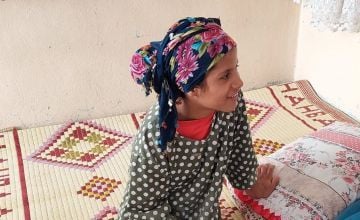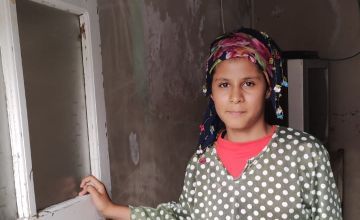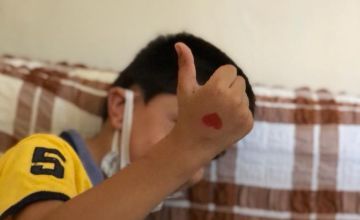
Read our 2024 annual report

Knowledge Hub
The Syrian war marks its 11th year this year.
For the Syrian people who fled their homes, life has continued but there are a huge range of challenges to contend with, notwithstanding the physical and mental trauma of war and the impermanent life that follows for far too many.
Children are particularly vulnerable.
During the formative years, it is critical that a child is exposed to friendships, familial love, and a safe environment. However, for many Syrian children, this is not the case. The traumas of war have the ability to affect a child’s development both mentally and socially.

Opening up family communication
13-year-old Eslem* has lived in Turkey for the last seven years after her family fled the war in Syria.
She hasn’t attended a learning or recreational centre since, nor did she attend school when her family was in Syria due to the war.
After some initial hesitation, Eslem’s father allowed her to attend one of Concern’s centres in Turkey which provide Psychosocial Support (PSS). The approach promotes people’s wellbeing, incorporating their thoughts, feelings, and behaviours together with their social connections and supports, during and after an emergency to prevent immediate or long-term mental health issues.
Family, friends, and the wider community play are an essential element, along with giving individuals strategies to support themselves with the goal of protecting, promoting and improving psychological wellbeing.
Before I came to Concern, I was like a closed box, closed to family communication.
Exploring happiness through play and self-expression using art, music, recreational activities and imaginative play allowed Eslem to be vulnerable and talk through her emotions which helped ease her worries and stresses.
Eslem mentioned her home several times throughout the 10 weeks of PSS programme, how its dull appearance affected her emotionally.
“The house looked like a ruin," she told us.
"The house made me feel tired. It smelled like an old shop, and different hues of voices came from every corner of the house.
“I want a new life. I want to have a white house.
“I feel bad when my friends come to my house and ask why we don't paint the house.”

Eslem’s feelings about her home and how it impacted her broader mental wellbeing shows the critical and important role the home plays in a child’s life.
When asked what about her dreams for the future, Eslem said, “I want to be a teacher and support my brothers and I believe that one day our house will be painted.”
Thanks to the project funded by EU humanitarian aid, the Psychosocial Support for Children programme aids 2,640 high-risk children like Eslem to build self-confidence as well as problem solving, interpersonal and communication skills.
Helping to find a whole new world
There can be many reasons why children don’t attend school or an education setting.
A family’s financial situation, child labour, knowledge of the local language, understanding of the school registration process, child marriage/engagement, learning and physical disabilities are just some of the reasons as to why children stay away.

Ahmad’s* family fled their home in Syria before he was born, when neighbouring towns started being bombed.
They arrived in the south-east of Turkey in 2013, and it was in these challenging circumstances of social, economic and emotional hardship that Ahmad was born.
As Ahmad grew older his mother noticed that he was not as active as other children. He had difficulty making friends. The family did not have the resources to properly support Ahmad, they struggled to find a caretaker and create a safe and suitable home environment for him.
Ahmad’s mother heard from her neighbours about the Psychosocial Support for Children programme in their area. She registered Ahmad and though attending the programme was the first time Ahmad left home, he adapted quickly. He interacted, shared and showed daily improvements with other children and PSS trainers.
Now 8-years-old, Ahmad is excited about all his new friends and looks forward to the fun he has with them and the PSS trainers.
I started feeling everything; life, happiness, and friendship.
Ahmad credits the programme for helping him accept his disability and making him feel born again.
Through the EU humanitarian aid funded project run by Concern, Ahmad now interacts more with his parents and four other siblings and dreams of his future.
When he gets older, he would like to become a police officer.
*Names have been changed to protect their identities

Other ways to help
Corporate support
Is your company interested in working together for a common cause?
Fundraise for Concern
From mountain trekking to marathon running, cake sales to table quizzes, there are lots of ways you can support our work.
Buy a gift
With an extensive range of alternative gifts, we have something to suit everybody.
Leave a gift in your will
Leave the world a better place with a life-changing legacy.
Volunteer with Concern
The lots of ways to get involved with our work as a volunteer
School fundraising
Without the generous support from schools, we wouldn't be able to do the work that we do.

